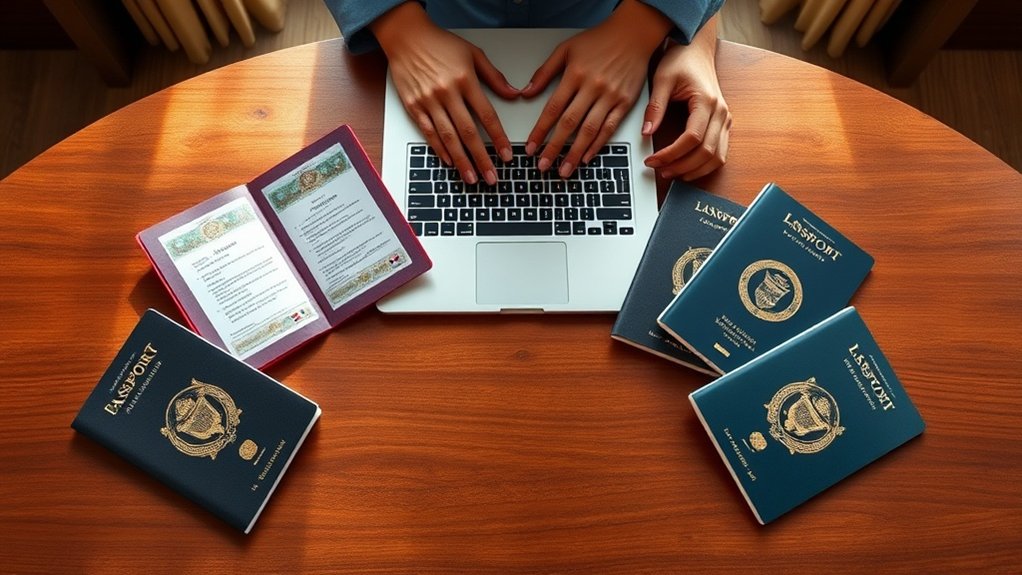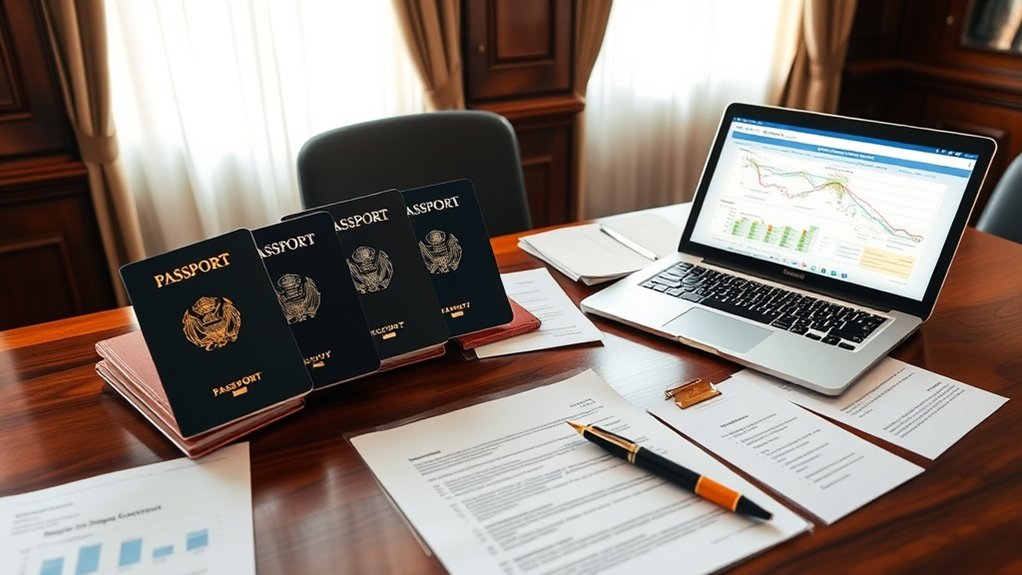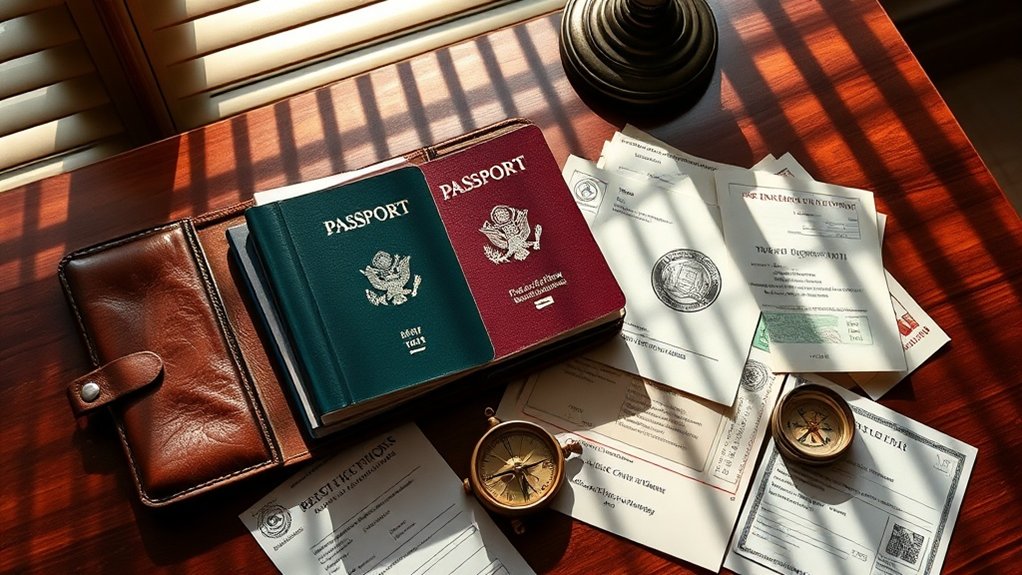You’re holding multiple passports as a digital nomad, but you’re likely filing under the wrong nationality and bleeding money through unnecessary taxes and compliance costs. Each passport you carry opens different legal pathways, tax treaty benefits, and regulatory advantages that most nomads never explore. Vieira Braga Advogados has developed a systematic approach to analyze your citizenship portfolio and identify which nationality offers the strongest legal and financial position for your specific situation.
Understanding the Legal Framework for Multi-Passport Digital Nomads

While navigating the world as a digital nomad presents exciting opportunities, holding multiple passports adds layers of legal complexity that you’ll need to understand before embarking on your journey. Each passport represents distinct legal obligations, from tax responsibilities to military service requirements. You’re bound by the laws of every country whose citizenship you hold, regardless of where you’re physically located.
Your choice of which passport to use when entering different countries can significantly impact your visa requirements, permitted stay duration, and legal protections. Some nations offer preferential treatment to specific nationalities, while others impose restrictions. Additionally, certain countries don’t recognize dual citizenship, potentially creating diplomatic complications.
Tax obligations become particularly complex, as you might face requirements in multiple jurisdictions simultaneously. Understanding treaty agreements between your citizenship countries helps prevent double taxation. You’ll also need to consider how your passport choices affect business registration, banking relationships, and legal recourse options while operating internationally. For digital nomads considering establishing a business presence, opening a company in jurisdictions like the USA can provide enhanced credibility and access to entrepreneur visas that facilitate long-term immigration pathways.
Tax Treaty Networks and Double Taxation Avoidance Strategies
When you hold multiple passports, strategic use of tax treaty networks becomes your most powerful tool for minimizing global tax burdens. Each citizenship unlocks access to different bilateral tax agreements, creating opportunities to reduce withholding taxes on dividends, royalties, and interest income.
You’ll need to analyze which passport provides the most favorable treaty rates with countries where you earn income. For instance, your German passport might offer better treaty benefits with certain jurisdictions than your Brazilian one. This requires careful documentation of your tax residency status and income sources.
Double taxation avoidance strategies involve timing your residency moves strategically and utilizing treaty tie-breaker rules. You can potentially claim treaty benefits by establishing genuine tax residency in the country whose passport offers superior treaty networks for your specific income streams.
However, you must maintain substance requirements and avoid treaty shopping accusations by ensuring legitimate economic connections to your chosen tax residence. For those considering Japan as a base, investment immigration provides a pathway to access the country’s extensive treaty network while benefiting from its stable economy and diverse market opportunities.
Business Registration Jurisdictions and Corporate Structure Optimization

You’ll need to strategically select business registration jurisdictions that align with your nomadic lifestyle and multiple citizenship options. Your corporate structure can significantly reduce tax burdens while providing operational flexibility across different countries where you hold passports. Consider jurisdictions like Estonia, Singapore, or Dubai that offer favorable tax regimes and digital-friendly business environments for location-independent entrepreneurs. The United States offers diverse visa options for entrepreneurs seeking to establish businesses, including the E-2 investor visa and EB-2 NIW visa for professionals with exceptional skills.
Jurisdiction Selection Strategies
Although tax implications often dominate discussions about international business structures, your choice of business registration jurisdiction affects far more than your tax bill. You’ll need to consider regulatory compliance requirements, banking accessibility, and legal protections available in each jurisdiction. Singapore offers robust financial infrastructure and streamlined business processes, while Estonia provides digital-first incorporation with e-Residency programs. Delaware remains attractive for eventual US market expansion due to its established corporate law framework.
Your passport portfolio directly influences jurisdiction accessibility and compliance costs. EU citizenship simplifies European business registration, while US citizenship may complicate certain offshore structures. Consider jurisdictions that complement your mobility patterns – registering where you’ll spend significant time reduces administrative burdens and potential tax complications from permanent establishment rules.
Brazil’s complex immigration laws require specialized legal support to navigate visa requirements and ensure proper documentation when establishing business operations or residency in the country.
Corporate Structure Benefits
Beyond jurisdictional considerations, the corporate structure you choose shapes your operational flexibility and financial efficiency as a digital nomad. You’ll find that certain jurisdictions offer streamlined incorporation processes, reduced reporting requirements, and favorable tax treaties that complement your multiple passport strategy.
Estonia’s e-Residency program lets you establish an EU company entirely online, while Singapore’s corporate structure provides access to extensive double taxation treaties. Delaware corporations offer operational flexibility for US market access, and Dubai’s free zones eliminate corporate taxes on qualifying activities.
Your optimal structure depends on your client base, revenue streams, and residency patterns. Consider hybrid approaches—perhaps a holding company in one jurisdiction with operating subsidiaries elsewhere. This configuration maximizes treaty benefits while maintaining operational agility across different markets and regulatory environments.
Countries like Australia and Canada provide stable economic foundations that can significantly reduce the bureaucratic challenges typically associated with international business operations compared to high-tax jurisdictions.
Visa Requirements and Work Authorization Considerations
You’ll need to strategically assess your passport hierarchy to determine which citizenship offers the strongest visa-free access for your target destinations. Your work permit strategies should align with countries where you can legally earn income as a digital nomad, whether through specific digital nomad visas or traditional work authorizations. Understanding visa-free travel benefits helps you maximize mobility while ensuring you’re always operating within legal frameworks for both tourism and remote work activities. For digital nomads considering long-term U.S. residency, employment-based visas like EB-1 and EB-2 provide pathways to permanent residency without requiring traditional job offers under certain conditions.
Passport Hierarchy Assessment
When you possess multiple passports, understanding their relative strength becomes crucial for strategic travel and work planning. You’ll need to evaluate each passport’s visa-free access, comparing the number of destinations you can enter without prior authorization. Rankings like the Henley Passport Index provide quantitative assessments, but you shouldn’t rely solely on these numbers.
Consider your specific travel patterns and business needs. A passport with fewer visa-free destinations might offer better access to your target markets. You’ll also want to examine visa processing times, costs, and approval rates for each nationality. Some passports facilitate easier business visa applications or offer longer permitted stays.
Don’t overlook diplomatic relationships between countries, as these can affect your treatment at borders and visa applications. For digital nomads considering long-term relocation, certain passports may provide better pathways to employment-based Green Cards such as EB-1 for extraordinary abilities or EB-2 for advanced degrees, depending on your professional qualifications and career objectives.
Work Permit Strategies
Understanding passport strength sets the foundation for your next strategic decision: determining where you can legally work as a digital nomad. You’ll need to navigate complex work authorization requirements that vary significantly between countries.
Your multiple passports create strategic advantages when pursuing work permits:
- Tourist visa exploitation – Use your strongest passport for visa-free entry while working remotely for foreign clients
- Digital nomad visa applications – Apply with the passport offering the most favorable processing terms and requirements
- EU citizenship leverage – If you hold EU nationality, you can work freely across 27 member states without additional permits
- Bilateral agreement utilization – Identify working holiday visas and special bilateral arrangements between your passport countries and target destinations
Strategic passport selection directly impacts your legal work authorization and compliance obligations. Given the complexity of immigration laws and constant regulatory changes, consulting with immigration lawyers ensures you select the optimal passport and avoid costly procedural errors that could jeopardize your work authorization status.
Visa-Free Travel Benefits
Since work authorization varies drastically from visa-free travel privileges, you can’t assume that entry without a visa grants you legal employment rights. Your passport’s visa-free access determines how easily you’ll cross borders, but it doesn’t automatically permit remote work or local employment. For instance, your German passport might allow 90-day visa-free stays in Brazil, yet working remotely for clients during that period could violate local regulations.
You’ll need to research each country’s specific digital nomad policies and remote work laws. Some nations explicitly prohibit any work activities on tourist visas, while others offer dedicated digital nomad visas. Portugal’s D7 visa and Estonia’s digital nomad permit exemplify countries adapting to remote work realities. Strategic passport selection maximizes your visa-free destinations while ensuring compliance with employment regulations. Portugal’s Golden Visa program offers investors a pathway to residency and eventual citizenship, providing enhanced mobility within the Schengen Area for those seeking long-term European access.
Banking and Financial Compliance Across Multiple Jurisdictions
The labyrinth of international banking regulations becomes your daily reality as a multi-passport digital nomad navigating financial compliance across different jurisdictions. Each passport you hold potentially triggers reporting obligations in its respective country, creating complex webs of disclosure requirements.
You’ll face varying banking standards depending on which nationality you present. Some institutions welcome certain passports while scrutinizing others due to regulatory frameworks or risk assessments. Your tax residency status affects which accounts you can open and maintain.
Consider these critical compliance factors:
- FATCA and CRS reporting – Automatic information exchange between countries affects your account visibility
- Beneficial ownership disclosure – Many jurisdictions require transparency about account controllers and fund sources
- Local banking regulations – Each country’s specific requirements for account maintenance and transaction monitoring
- Currency controls – Restrictions on fund movements that vary significantly between jurisdictions
Strategic passport selection optimizes your banking relationships while ensuring regulatory compliance. When establishing financial presence in Brazil, obtaining a CPF becomes essential for banking access, contracts, and accessing public services as part of your broader immigration regularization strategy.
Intellectual Property Protection and Filing Strategies

While financial compliance demands constant attention, protecting your intellectual property across multiple jurisdictions requires equally strategic thinking as a multi-passport digital nomad. Your multiple citizenships create unique opportunities for IP filing strategies that single-passport individuals can’t leverage.
You’ll need to evaluate which nationality offers the strongest protection for your specific IP type. Patent filing through your EU passport might provide broader regional coverage, while trademark registration through your US citizenship could offer stronger enforcement mechanisms. Consider timing carefully—some jurisdictions offer priority filing advantages that you can maximize with strategic passport selection.
Your residence patterns also matter. Establishing IP ownership through a jurisdiction where you maintain substantial business presence strengthens your legal position. You can’t simply forum-shop without legitimate connections, but authentic multi-jurisdictional ties give you genuine options.
Document your decision rationale thoroughly. IP disputes often scrutinize filing choices, so maintaining clear records of your strategic reasoning protects against future challenges.
Residency Status Determination and Legal Domicile Selection
Beyond protecting your creative assets, you must navigate the complex web of residency determinations that can dramatically impact your tax obligations, legal rights, and business operations. Your multiple passports create opportunities, but they also generate complications that require strategic legal domicile selection.
Establishing optimal residency isn’t simply about where you spend most days. It’s about creating a defensible legal framework that supports your nomadic lifestyle while minimizing risks.
Key considerations for residency determination include:
- Tax treaty networks – Choose domiciles with favorable double taxation agreements across your target markets
- Substance requirements – Ensure you meet minimum physical presence and economic activity thresholds
- Banking accessibility – Select jurisdictions that facilitate international banking relationships for nomads
- Legal system compatibility – Align your domicile with jurisdictions offering strong contract enforcement and IP protection
Your residency strategy should complement your intellectual property filing approach, creating a cohesive international legal structure.
Risk Assessment and Regulatory Compliance Management

As regulatory landscapes shift across jurisdictions, you’ll face an intricate maze of compliance requirements that can expose you to severe penalties if mismanaged. Each passport you hold creates distinct obligations, from tax reporting deadlines to mandatory military service requirements. You’re responsible for monitoring changes in laws across multiple countries while maintaining accurate records of your movements and income sources.
| Risk Category | Potential Consequences | Mitigation Strategy |
|---|---|---|
| Tax Non-Compliance | Penalties up to 50% of owed taxes | Quarterly review with tax advisors |
| Visa Violations | Entry bans, deportation | Digital tracking of stay durations |
| Banking Reporting | Account freezes, FATCA penalties | Proactive disclosure protocols |
| Military Obligations | Arrest warrants, citizenship loss | Legal exemption documentation |
| Healthcare Coverage | Emergency medical debt | Multi-jurisdiction insurance plans |
You’ll need automated systems to track compliance deadlines and professional advisors who understand multi-jurisdictional complexities. Regular audits of your legal standing prevent costly oversights.
Strategic Implementation and Long-Term Planning Considerations
Since you’ve established your compliance framework, you must now architect a comprehensive strategy that aligns your nomadic lifestyle with your financial objectives and personal values.
Your implementation strategy requires careful coordination across multiple jurisdictions while maintaining flexibility for future opportunities. Consider these essential planning elements:
- Timing Optimization – Coordinate visa applications, tax residency changes, and business relocations to minimize gaps in legal status and maximize favorable tax periods.
- Documentation Systems – Establish robust record-keeping protocols across all jurisdictions, including digital backups accessible from anywhere and physical document storage in secure locations.
- Professional Network Development – Build relationships with qualified advisors in each target country, including tax professionals, immigration lawyers, and banking specialists who understand multi-jurisdictional complexities.
- Exit Strategy Planning – Design contingency plans for regulatory changes, personal circumstances shifts, or geopolitical developments that might affect your mobility or tax optimization strategies.
Regular strategy reviews ensure your approach remains effective as circumstances evolve.
Frequently Asked Questions
What Happens if One of My Passports Gets Revoked or Expires?
If one passport gets revoked or expires, you’ll still have your other valid passports for travel and legal purposes. However, you should immediately update any official documents, bank accounts, or legal filings that referenced the invalid passport. Contact relevant authorities where you’ve used that passport for identification. Your lawyer can help you transition to using an alternative passport for ongoing legal matters and ensure you’re compliant with local requirements.
Can I Use Different Passports for Different Business Ventures Simultaneously?
You can absolutely use different passports for separate business ventures simultaneously. Each passport represents a distinct nationality with unique tax implications, banking access, and regulatory requirements. You’ll want to strategically match each passport’s advantages to specific business needs – one might offer better tax treaties while another provides easier market access. Just ensure you’re compliant with all relevant jurisdictions’ disclosure requirements and tax obligations for each venture.
How Do I Handle Passport Renewal While Living in a Third Country?
You’ll need to visit your home country’s embassy or consulate in the third country where you’re residing. Contact them beforehand to schedule an appointment and confirm required documents. Bring your current passport, completed renewal application, passport photos, and any supporting documentation they specify. Processing times vary by country and location, so apply well before your current passport expires to avoid travel disruptions.
Which Passport Should I Use When Opening New Bank Accounts?
You’ll want to use the passport that offers the most banking advantages in your target country. Consider which nationality has the strongest banking relationships, lowest tax reporting requirements, and fewest regulatory restrictions with that specific bank. Research FATCA implications if you’re American, and check if certain nationalities get preferential account terms. You can legally choose which passport to present when opening accounts.
Do I Need to Declare All My Citizenships to Every Government?
You don’t need to declare all your citizenships to every government, but specific situations require disclosure. You must report citizenships when applying for visas, security clearances, government jobs, or certain professional licenses. Tax obligations vary by country – some nations tax based on citizenship regardless of residence. When crossing borders, you’re typically only required to declare the passport you’re using for entry, not additional citizenships you hold.
Conclusion
You’ll maximize your global mobility and financial efficiency by partnering with experts who understand the intricate balance of multiple citizenships. Your success as a digital nomad depends on strategic nationality selection that optimizes tax treaties, streamlines banking compliance, and ensures seamless visa access. Don’t navigate these complex waters alone—you need specialized guidance to protect your assets, minimize tax burdens, and maintain legal compliance across all jurisdictions while building your remote career.
